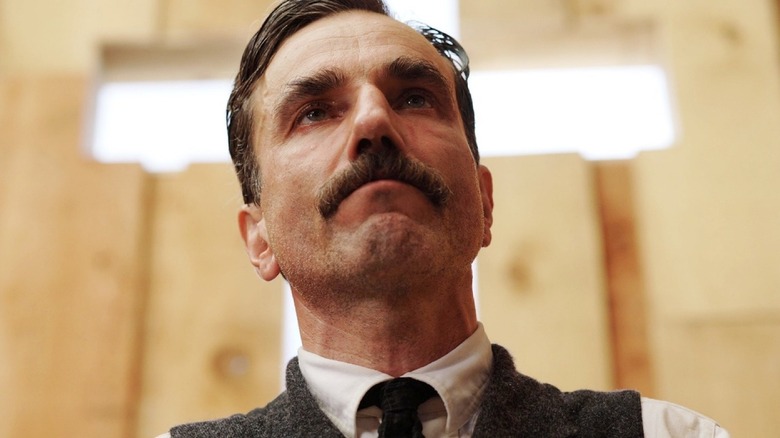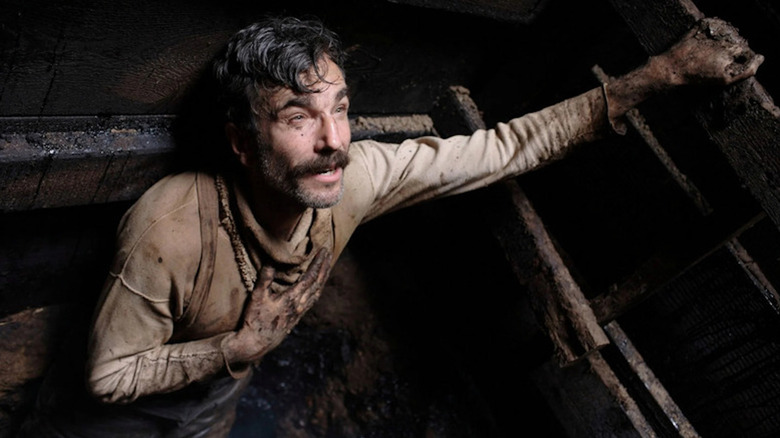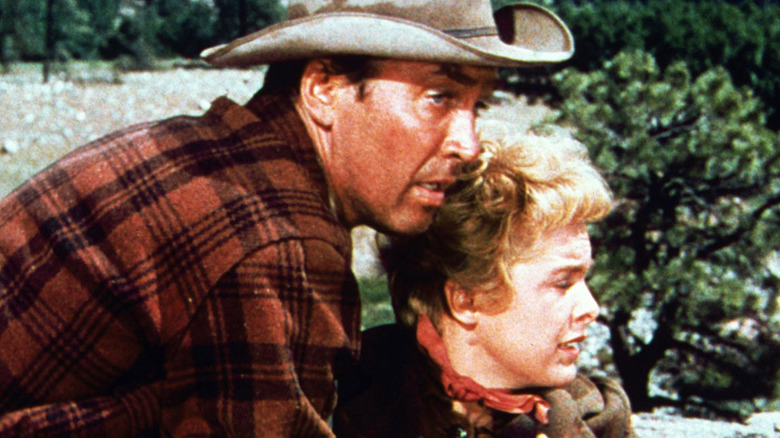Daniel Day-Lewis Does Not Like John Wayne (But Was Inspired By Robert De Niro)
Daniel Day-Lewis is a method actor's method actor. He burrows so deep into his characters he becomes them for a time. When he portrayed Abraham Lincoln, he would text Sally Field, who played Mary Todd Lincoln, in the voice of the Great Emancipator. Given his knockout good looks and palpable screen presence, Day-Lewis could've made a killing as a movie star, but he understood his value as a performer, and carefully called his shots after winning his first Academy Award for Best Actor as artist Christy Brown, who famously created while having cerebral palsy, in Jim Sheridan's "My Left Foot."
Over his 20 credited performances, Day-Lewis has only made two movies that could be considered pure genre efforts: Michael Mann's frontier adventure "The Last of the Mohicans" and Rob Marshall's godawful adaptation of the musical "Nine." But even these are deep-tissue immersions. Day-Lewis has resisted the temptation to be Day-Lewis. So it's not a surprise to learn that he has zero affection for the exceptionally stolid icon of American Westerns.
Day-Lewis is no man of the West
When Paul Thomas Anderson cast Day-Lewis in "There Will Be Blood," a loose adaptation of Upton Sinclair's novel "Oil!", the notion of our greatest living actor occupying the turn-of-the-20th-century Western expanse conjured images of everything from John Wayne in "The Searchers" to James Dean in "Giant." We had no idea. As ruthless prospector Daniel Plainview, Day-Lewis drills down into the crudest of American crude. His antihero lives only to protect his considerable financial holdings.
And yet, from the start of his acting career, Day-Lewis had little interest in making his mark in American movies. He was trained to revere Shakespeare, Ibsen, and Chekhov: the old, durable masters. As he told The New York Times in 2007:
"Where I come from, it was a heresy to say you wanted to be in movies, leave alone American movies. We were all encouraged to believe that the classics of the theater were the fiery hoops through which you'd have to pass if you were going to have any self-esteem as a performer. It never occurred to me that that was the case."
As for Westerns, they're just not his thing. He told The New York Times in a separate interview:
"I don't particularly like westerns as a genre, but I do love certain westerns. 'High Noon' means a lot to me — I love the purity and the honesty, I love Gary Cooper in that film, the idea of the last man standing. I do not like John Wayne: I find it hard to watch him. I just never took to him. And I don't like Jimmy Stewart as a cowboy."
Jimmy Stewart was a fine cowboy
I adore Day-Lewis as an actor and trust his instincts, so I can't help but wonder if he's seen Stewart in Anthony Mann's "Winchester '73" or "The Naked Spur." The latter contains one of Stewart's most stirring performances: as bounty hunter Howard Kemp, he traverses the gamut of emotions from hard-nosed lawman to a weepy failure of manhood. He's a man of rough principle, and, in the end, finds his salvation in Janet Leigh's Lina Patch, who renounces her loyalty to Robert Ryan's outlaw, Ben Vandergroat.
Day-Lewis' American acting hero was, unsurprisingly, Robert De Niro, whose portrayal of Travis Bickle in Martin Scorsese's "Taxi Driver" knocked the aspiring performer for a loop. "The world he offered in his performances had a palpable humanity," said Day-Lewis to The New York Times. "I was utterly sure that he was that man in 'Taxi Driver.' I have no idea by what means he arrived at that but, I dare say, at some point, he convinced himself that he was that man, too."
As for Wayne, of course, he holds no appeal for Day-Lewis. He was a star who made the most minor of adjustments from movie to movie. It's a shame Day-Lewis can't enjoy the rugged charms of "Red River" or "Rio Bravo," but the man knows what he wants out of a movie, and he's rarely left us disappointed. But if you're thinking what I'm thinking, a Steven Spielberg-directed remake of "The Searchers" with Day-Lewis riding high in the saddle ain't the worst idea.


